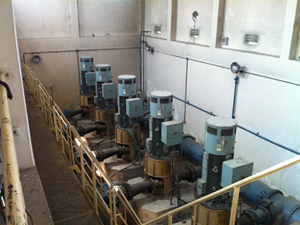We are providing hydraulic modelling services for a major water supply improvement and sanitation project in the Bangladeshi city of Chittagong.
With an estimated population of 4.2 million, Chittagong is the second largest city of Bangladesh – as well as a very important industrial base in the country. Chittagong Water Supply & Sewerage Authority (CWASA) has managed the city’s water network since 1963. CWASA is now in the process of implementing the Chittagong Water Supply Improvement and Sanitation Project (CWSISP), with funding support from the World Bank. The project, which commenced in 2010, will conclude in 2015.
A consultant appointed by the World Bank had already developed a preliminary hydraulic model for the project and we were asked to upgrade this model. The purpose of this is to update and calibrate the entire hydraulic model. This will ensure that it represents the current conditions and can be used to support the design. We were appointed as the ‘Hydraulic Team Leader’, with the actual hydraulic team consisting of the prime project consultant Grontmij and the Institute of water Modelling in Dhaka (IWM). We’re developing the model based on EPANET – the worldwide standard for water distribution modelling.
The model covers approximately 560 km (350 miles) of main pipelines – the maximum pipe diameter being 1,200 mm (48 inches). Surface water sources, groundwater sources, and tube wells provide approximately 6.5 m3/s (230 ft3/s) of water to 600,000 households and industry – and the water losses are estimated to be 48%.
The hydraulic model will support long-term planning, including:
- designing a permanent control system to manage losses by the time the additional water production comes on-line
- defining and designing network improvements
- designing new transmission pipes
- coordinating and supervising the execution of all the interventions
- restoring 24-hour supply
- developing capacity for comprehensive active leakage monitoring and control
It’ll also support non-regret investments – investments that need to be done irrespective of the long-term plans. Such investments are needed to bring about immediate improvements in the water supply conditions and in the case of the CWSISP, amount to approximately USD 25 million.